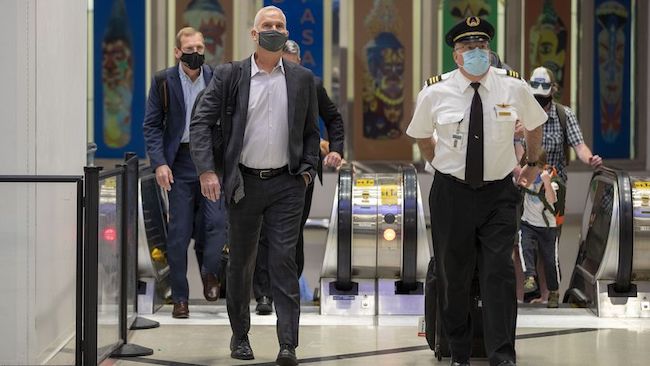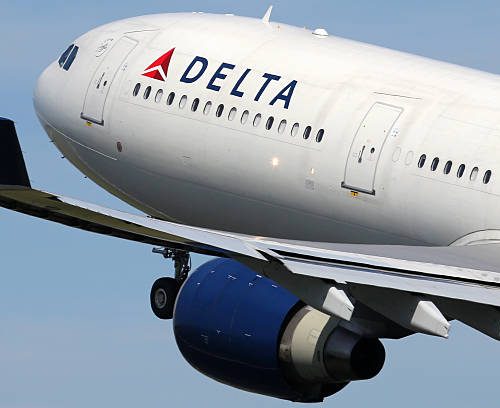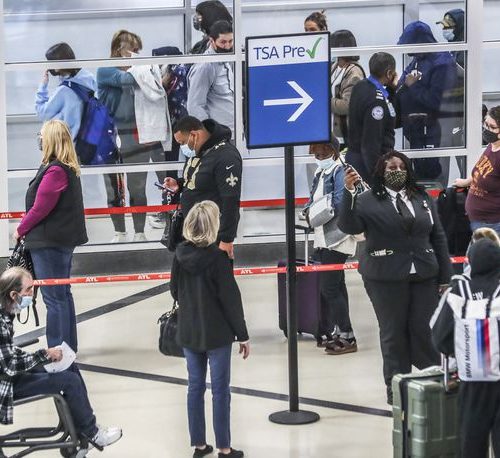By Kelly Yamanouchi, The Atlanta Journal-Constitution
Troy Warren for CNT
Atlanta’s economic fortunes linked to corporate trips, conventions
American leisure air travel is bouncing back quickly after plunging last year.
But it could take months or years for business travel to return to normal — if ever — even as more companies prepare to bring workers back to offices.
That spells uncertainty for metro Atlanta’s economy, which hosted hundreds of trade shows and conventions before the pandemic. Eighteen Fortune 500 companies have their headquarters in Georgia, also drawing a steady stream of visitors with expense accounts through Hartsfield-Jackson International Airport until last year.
Instead of boarding a plane, many white-collar workers are meeting clients on Zoom. Employers also are weighing the health and legal risks of sending road warriors potentially in harm’s way while COVID-19 is still circulating and many people aren’t vaccinated.
“Understanding which employees are eligible and comfortable to meet in person is question No. 1. It starts off with just a lot of conversations,” said Maureen Brady, chief operating officer at Corporate Travel Management.
Many corporations “are trying to navigate through that murky water right now,” added Brady, whose company provides corporate and business travel planning services.
With the start of the busy summer season, domestic leisure travel recovered to more than 100% of pre-pandemic levels this month, according to Delta Air Lines, as Americans catch up on unused vacations and delayed family reunions.
But recent weekly data on bookings for corporate air travel sold by U.S. travel agencies were still down 64.6% from 2019, according to industry group Airlines for America. Business travel in and out of Atlanta was down 85%, compared with 93% at the start of the year, estimated American Express Global Business Travel.
Many in the industry expect it could be 2023, 2024 or laterbefore business travel fully recovers. If then.
That’s bad news for airlines, who have made more money over the decades selling higher-priced business class seats — especially for overseas trips that in normal times cost as much as $10,000 — than the economy seats at the back of the plane.
Before the pandemic, business travelers made up about 30% of airline trips but an estimated 40% to 50% of passenger revenues, according to Airlines for America. Atmosphere Research Group analyst Henry Harteveldt estimates business travelers typically represent 55% to 75% of airlines’ profits.
In the past, Atlanta’s many company headquarters hosted thousands of visiting employees, salespeople and business partners. The city had about 880 conventions, meetings and events in 2019, driving more than 1.6 million hotel room-night bookings, according to the Atlanta Convention and Visitors Bureau, which is seeing only the beginnings of a recovery.
At Atlanta-based Home Depot, the travel policy “was pretty tight” during the pandemic, said spokeswoman Margaret Smith. Now, if employees are considering planning a business trip, they are asked if they can accomplish their objective remotely. If not, employees who are fully vaccinated can travel domestically for “business-critical reasons” — a determination made between employee and manager.
Atlanta-based Coca-Cola is also restricting travel to “business critical only,” but said it will review its policy for domestic and international travel over the coming months.
A June survey by the Global Business Travel Associationindicated 40% of companies worldwide had resumed non-essential domestic business travel, but only 12% had resumed non-essential international business travel. International trips face higher hurdles with quarantine restrictions in many countries.
One factor slowing the rebound: the legal concept of “duty of care.” Corporations “have the responsibility to ensure the safety of their employees when their employees are asked to travel for business,” said Corporate Travel Management’s Brady.
Executives are being advised by legal, risk and human resources departments and “they need to know that all risks have been looked at,” said Teri Miller, executive vice president of corporate travel management firm BCD Travel, which has its U.S. headquarters in Atlanta.
Beyond corporate executives, the business traveler population includes salespeople meeting with clients or heading to conventions, as well as technicians and regional managers visiting sites.
Some workers have been traveling throughout the pandemic, including those in logistics, energy and health care, such as technicians who service medical devices. And those who work for small- and medium-sized companies often have been less bound by corporate travel restrictions.
Rafal Los, a cybersecurity executive who lives in Vinings, has been traveling for work since last fall, including trips to his company’s headquarters in Salt Lake City.
“Sometimes you have to go where the customers is, where the work is. That requires you to take a certain amount of risk on,” said Los, whose company has fewer than 100 employees.
And, he added, “Sitting in my home office is miserable as hell, frankly.”
Los often spoke at industry conferences before the pandemic. Now that live events are planned in his industry for July and August, “I’m signing up for every single one of them.”
Many other road warriors are itching to return to normal. A recent survey by American Express, which has a corporate travel management unit, found 86% of business travelers want to hit the road when it’s safe.
Nationally, business travelers spent $334.2 billion in 2019, including trip expenditures for hotels, transportation, restaurants, retail and recreation, says the U.S. Travel Association.
Airline executives have taken to emphasizing a mantra that, as United Airlines CEO Scott Kirby puts it, “The first time someone loses a sale to a competitor who showed up in person, is the last time they try to make a sales call on Zoom.”
Ed Bastian, Delta’s CEO, says his airline increasingly is banking on small- and medium-sized businesses to drive the recovery. He also believes video conferencing will complement but not replace business travel.
“Video technology actually makes you mobile,” said Bastian, adding that it allows you to “take your office with you” and continue participating in company meetings while traveling.
Still, he expects traditional corporate travel could decline by 20% to 30%. Some segments may never return, he acknowledged, including high-priced short business trips to Europe for a single brief meeting.
For now, employers “want to ensure that employees don’t feel pressured to travel if they don’t feel comfortable,” said Jeremy Quek, global air practice lead at American Express Global Business Travel. “For people to travel when they’re uncomfortable doesn’t do anybody any good.”
Miller, at BCD Travel, said some companies are considering whether to require that employees be vaccinated before traveling, which she thinks might be a hard sell. “Some people have pretty strong opinions about this,” said Miller.
The pandemic “gave us all that pause button that allowed us to re-evaluate how to do this, and maybe how to travel smarter,” she added.
A June survey by the Global Business Travel Associationshowed travel managers think:
19% of employees are very willing to travel
58% are somewhat willing
5% are not willing
1% are not willing at all
Others are ambivalent or unsure.
In Other NEWS



































